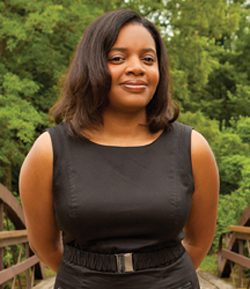The Job Seekers

Cynthia Edwards. Photo by Jim Newberry
Editor’s note: After this story went to print in August, we learned one subject, Cynthia Edwards, has gained a full-time but nonattorney position with the American Medical Association. She is a licensing coordinator in the AMA’s publications department. She wrote: “I’m excited to finally have a full-time gig with benefits, a salary, etc., and also to be able to utilize my law degree in a way I’d like to.”
One year after graduating from Northern Illinois University School of Law in 2009, Cynthia Edwards had two part-time jobs: an assistant position with a lawyer / talent agent and temp work for publisher McGraw-Hill getting written permissions from contributing authors for medical textbooks.
At 26, she lives with her parents in the western suburbs of Chicago and earns about $1,000 a month, supplementing her income by selling jewelry and exercise equipment on eBay. Since graduation she’s applied for hundreds of jobs and had 15 interviews. “I’m still applying for jobs but not every day because there was a point where I drove myself crazy,” Edwards says. “I would get on the computer and stay up until 4 a.m. applying for jobs.”
“It’s kind of frustrating because I have lots of friends who work in other fields,” she says. “They want to do stuff [with me], and I really have to watch my budget.
“Right now, watching TV is one of my biggest enjoyments,” says Edwards, whose dream job would be working for a television station on the business side. “My parents are great, but I’m very eager to have my own independence.”
Her eBay sales netted Edwards about $3,000 in the past year, including selling bellybutton rings she buys wholesale and sells at a markup. “My friends say I’m hustling,” Edwards says. “I kind of put my lawyer’s hat on, negotiating different prices.”
This life isn’t what she expected when she entered law school. And her story is not unique. In late July, NALP reported the employment rate for 2009 graduates of ABA-accredited law schools is 88.3 percent, 3.6 percent lower than the recent historical high of 91.9 percent for the class of 2007.
But that figure, says NALP, “masks a number of weaknesses in the job market.” The legal professionals organization said its research shows “between 3,200 and 3,700 graduates who reported jobs in law firms had their start dates deferred beyond Dec. 1, 2009. In addition, … nearly 25 percent of all jobs were reported as temporary.”
Law school ‘risk’
Law professionals speaking in the starkest terms now describe law school as “a risk.” Salary figures for 2009 graduates working full time seem promising: Median annual pay is $72,000, and the average is $93,454. However, NALP warns that those figures are misleading.
“Because some large law firm salaries cluster in the $160,000 range while many other salaries cluster in the $40,000-$65,000 range, relatively few salaries were actually near the median or mean,” a press release says. NALP also notes that salaries at major law firms are public record, but less than half of salaries at smaller firms are reported, further skewing the averages.
“The industry is just changing in a really big way, and the changes happening are at odds with this mental model driven by pop culture in young people’s minds,” says William D. Henderson, a professor at Indiana University’s Michael Maurer School of Law. His research focuses on law school rankings, law firm economics and empirical analysis of legal education. “So yeah, it’s really friggin’ risky.
“If you have a passion for law and are an entrepreneur, I still think it’s a great investment,” he says. “You’re getting a knowledge base, and you’re on your own to mine that knowledge base.”
Despite the disheartening employment numbers, it appears that a growing number of people think they have what it takes. According to the Law School Admissions Council, applications for ABA-accredited law schools rose 3.9 percent in 2009. A New York Times article in January said applications to Cornell Law School were up 44 percent, and the number of people taking the Law School Admissions Test rose 20 percent in October 2009.
But the employment picture, coupled with a changing private practice model and increasing law school tuition, make many already in the profession wonder.
“I run into these guys from (the class of 2009) with $170,000 in loans and they’re telling me that they have no options, they’re going to be contract attorneys the rest of their lives. That can be a terrifying reality when confronted with it,” says Will Meyerhofer, a former Sullivan & Cromwell associate who now has a New York City psychotherapy practice. Many of his clients are recent law school graduates looking for work.
“I think the profession is in crisis,” he says, “and there’s going to be an enormous bubble popping.”
(See “Proposition Looks at Law Degree’s Value.”)
$15-an-hour work

Christian Arizmendi. Photo by Jim Newberry
Christian Arizmendi, a 2009 DePaul University law graduate, is also part of that 25 percent who haven’t found a full-time job. He works about 10 hours a week in Chicago for two different sole practitioners.
One pays him $15 an hour, the other $25. Arizmendi, who’s interested in being a music lawyer, hopes to get more legal work, and he expects to pick up additional income painting houses during the summer.
What legal work Arizmendi has, he enjoys. One of his employers is an entertainment lawyer and the other handles immigration and plaintiffs employment matters.
“I feel I’m doing better work than I would have been doing as an associate at a big law firm in better times,” Arizmendi says. “Now I’m really involved in whatever comes through the door, and I’ve had the opportunity to meet with clients on my own.”
Midway through his senior year at DePaul in Chicago, Arizmendi started thinking a JD would be a “useful tool.” As a business major with emphasis in music, he didn’t feel college prepared him to go out and get a professional position.
“I’d had internships,” he says, “but all we really did was answer phones.” Arizmendi has about $145,000 in student loans, deferred through January 2011.
“For people who are considering law school for the money, I would tell them to think twice about it,” he says. “Take another look at the job market; it’s not as safe of a career choice as it used to be.”
When Meyerhofer meets with patients who are unhappy lawyers and asks why they entered the profession, many say money was a motivator. Meyerhofer also works with people considering law school and says their motives are similar. He tells them “selling out” may not be an option anymore.
“Rather than making $160,000,” Meyerhofer says, “they’re saddled with $160,000 in debt.”
Among his lawyer clients who can’t find work, he sees a lot of self-attacking. “But these are economic realities that have nothing to do with talent or hard work,” Meyerhofer says.
Cameron Powell, an attorney coach and legal recruiter in Bend, Ore., agrees. His business, Charles River Recruiting, gets many resumés from new lawyers without jobs.
As a career coach, Powell says being out of work isn’t such a bad thing. Most of his coaching clients are lawyers with jobs; and Powell, the founder of Hot Blue Coaching, estimates that 90 percent of them are unhappy.
“There are some amazingly talented people who go into the law and it’s not for them,” he says. “This may bring balance back to the ones who get in and are truly in their hearts not committed to being lawyers.”
The rough legal market, Powell adds, gives permission to recent law school graduates having second thoughts about the work to try something else.
“The hardest way to be unemployed is to really be resisting unemployment and just be frantic,” he says. “Now is the time for them to explore what makes them happy.”
That’s easy to say when he’s not the one who’s unemployed, he admits.
Powell also admits that when he graduated from Harvard Law School in 1992, he and many of his peers weren’t sure they wanted to be lawyers. But a big difference is that in 1992, law school tuition averaged about $13,730 a year at private law schools, according to NALP, and public law school tuition was about $4,015 a year.
“The tragedy here is that we weren’t punished as badly,” Powell says. “If I was in their shoes, I’d be thinking just like them—that my life was over. But as someone who’s been out two decades and deals with a lot of lawyers, I can assure them that their life is not over.”
Where to go?

Matthew Brown. Photo by Cameron Davidson
Mathew N. Brown, a 2009 graduate of Georgetown University Law Center who has yet to find permanent employment, isn’t sure what he wants to do next. He was a summer associate after his first year of law school, but didn’t enjoy the experience. He was also interested in getting a government law position, but had no luck.
“Up to that point, everything I had tried to do was met with some degree of success,” Brown says. “I wasn’t getting the rewards for the efforts, and it just made me feel bad about myself.”
So in the summer of 2009, the day before Brown was to take the Maryland bar exam, he withdrew. He hadn’t found a job and concluded he needed some time to recover from his law school experience.
“There was a lot of pressure from family and friends saying, ‘You’ve gotten this far. Why don’t you just do it?’ ” says Brown, who moved back to Rockville, Md., with his parents. “But the second I realized I didn’t need to [take the bar exam] for them, it was very freeing.”
Brown had started thinking about law school his junior year at the University of Iowa, where he got a sociology degree. He decided he’d go only if he was accepted to a law school that excited him, and Georgetown did.
The summer before law school started, Brown thought he’d eventually go into private practice. Now he’s managing a moving and storage company a friend started that serves college students in the Washington, D.C., area. He’s also done some consulting work for his parents’ medical research business and volunteered on a friend’s political campaign. Brown’s search for a more stable position continues, but at this point he’s not sure it would be law-related.
“I think where I am right now, I would apply for jobs that would interest me. If it requires bar admission, I would try and work out something where, if they hired me, I would absolutely take it,” Brown says. “I know that isn’t a great way to get employed.”
He doesn’t regret going to law school, but if he had it to do over again, he might have opted for a state school instead of Georgetown, where full-time tuition is $22,552 a semester. Brown graduated with about $190,000 in school loans. Interest on the loans, he estimates, puts his school debt at slightly more than $200,000 today.
“I think I would have considered the risk that the investment entails. It’s an investment that’s not guaranteed,” Brown says. “You put up the time and money, and hope that it pays off.”
Not good news
Edwards first thought about becoming a lawyer while attending law-related press conferences. Graduate journalism programs recruited her, but she decided on law school instead.
“Sometimes I wonder what would have happened if I really looked into those programs,” Edwards says. “But it comes down to everything happens for a reason.”
Edwards had planned to attend Chicago’s Loyola University School of Law, but she changed her mind after a lawyer she met noted Northern Illinois’ annual tuition of $14,846 was significantly less than Loyola’s $37,380. Today Edwards has less than $60,000 in school debt.
After her first year of law school, Edwards decided she wasn’t interested in a traditional law job.
“I honestly did panic, and my mom thought I was crazy,” says Edwards, who decided to finish law school after reading a book about nontraditional legal jobs. She set a goal of finding a job on the business side of entertainment, mostly looking for work through online sites. She spent a summer in Los Angeles attending an entertainment law program at Southwestern University School of Law. She also applied for entertainment internships and took the California bar exam.
“I did not pass it,” she says. “I came back to Illinois and was not very happy, but I realize that bar exams are difficult.”
This summer she took the Illinois bar exam. She left her talent agency job the month before but kept the temp gig with McGraw-Hill.
“My talent agency hinted that they’d like me back when I pass the bar, but I’m more focused on nonlegal jobs at this point,” she says. “But we’ll see what options I have come September. What’s most important to me is to get a full-time job that has security and benefits.”
Edwards says many of her law school friends with law licenses still haven’t found work.
“I’m trying to use my law degree in a nontraditional way,” she says. “A lot of people I run into look at me like I’m crazy.”
Sidebar
Proposition Looks at Law Degree’s Value
Last year, then-ABA President Carolyn B. Lamm created the Commission on the Impact of the Economic Crisis on the Profession and Legal Needs to help lawyers deal with the bad economy.
One piece of the commission’s work is The Value Proposition of Attending Law School (PDF), a four-page document that discusses legal education costs and job prospects for recent law school graduates.
Noting the quick rise in law school tuition costs—at twice the rate of inflation over the last 25 years—and the prospect for even more increases while the recession saps student resources, the proposition says, “What many [students] do not know, however, is that these costs often exceed the expected return on their investment in the job market.
“In short, going to law school can bring more financial difficulty than many law students expect,” the report states. “The lack of financial return, of course, does not mean that it is not valuable to go to law school. … It does mean, however, that students should think twice before going to law school simply for the money.”
Commission chair Allan J. Tanenbaum, an Atlanta lawyer, says the panel developed the value proposition because commission members felt the considerations it lists were not sufficiently presented.
“We’ve asked and encouraged career guidance counselors, both in colleges as well as admissions offices in law schools, to make [students] aware of the information,” says Tanenbaum, general counsel and managing partner of Equicorp Partners, a private equity firm. “To the extent I’ve had conversations with law schools or deans, they don’t disagree with any of the information we’re providing because it’s information.”
The ABA commission, which concluded its work in June, also looked at law school loans and how that debt burdens recent graduates. “Students are coming out [of law school] with an enormous amount of debt,” Tanenbaum says, “and they’re faced with no jobs, deferred jobs or lower-paying jobs, and they have no present financial plan to be able to repay.”
At February’s midyear meeting, the ABA House of Delegates approved the commission’s resolution to call on the U.S. Congress, the executive branch and commercial lenders to aid those with heavy debt by:
› Converting private debt into federal loans, which offer more flexible payment options.
› Identifying federal funding to “cover interest payments for graduates who defer loans because of economic hardship.”
› Making repayment terms more flexible for federal student loans.
Commission member Joanne A. Epps, dean of Temple University’s law school, notes, “People five years ago expected to have to fight for a job that was exactly the one they wanted. Now they’re fighting for a job.”
Correction
In print and the initial online version of the “The Job Seekers,” September, an incorrect figure was given for tuition at Georgetown University’s law school. Current tuition and fees at Georgetown Law total $22,552.50 per semester.The ABA Journal regrets the error. Write a letter to the editor, share a story tip or update, or report an error.



